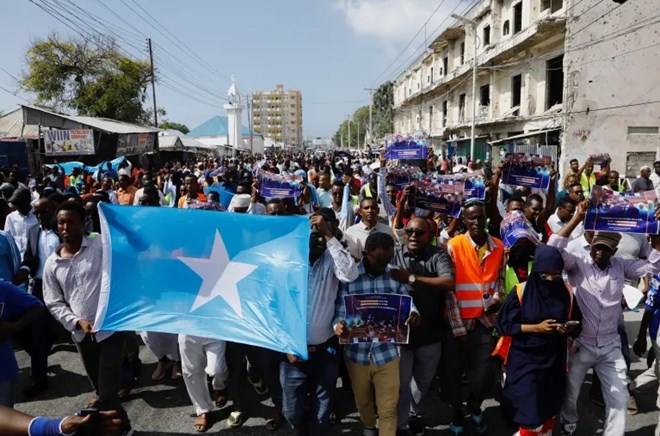
Sunday February 11, 2024

FILE - Somali people march against the Ethiopia-Somaliland port deal at the Yariisow stadium in Mogadishu, Somalia, on January 3, 2024 [Feisal Omar/Reuters]
Mogadishu (HOL) - In a strongly worded statement released on February 11, 2024, Somalia's Ministry of Foreign Affairs has unequivocally denounced a Memorandum of Understanding (MOU) signed between Ethiopia and the Somaliland provincial administration on New Year's Day. Labelling the agreement as a "clear violation of Somalia's sovereignty, unity, and territorial integrity," the ministry's press release emphasized Somalia's firm stance against what it perceives as an encroachment by Ethiopia, in cooperation with the Somaliland administration on its national sovereignty.
The controversial MOU, which has not been disclosed in full detail to the public, reportedly allows Ethiopia to develop a naval base on Somaliland's coast. The move has ignited controversy across the region, challenging the stability of one of the world's most volatile regions.
According to Somalia's national constitution and laws, no regional administration within the country, including Somaliland, possesses the authority to enter agreements with foreign nations independently. As such, the Somali government has declared the MOU "null and void" and has voiced readiness to defend its sovereignty, echoing historical conflicts and underscoring the deep-seated tensions between Somalia and Ethiopia.
Somaliland's quest for independence since breaking away from Somalia in 1991, coupled with its lack of international recognition, adds layers of complexity to the situation. Somaliland sees the MOU with Ethiopia as a step towards legitimizing its self-determination.
Ethiopia's motivation for the MOU is rooted in its landlocked predicament, relying heavily on neighbouring Djibouti for over 90% of its trade. The agreement with Somaliland, which offers Ethiopia access to the sea, reflects pressing economic and security needs. Ethiopia's Prime Minister, Abiy Ahmed, has emphasized that the deal aims to benefit the region at large, denying any intentions to harm Somali sovereignty.
Somalia's Ministry of Foreign Affairs further criticizes Ethiopia's actions as a "dangerous breach of international law" and an affront to the cooperative norms among neighbouring states. The ministry's statement spotlights the potential destabilizing effects of the MOU on the Horn of Africa.
The press release also ties Ethiopia's engagement with Somaliland to broader concerns about regional security and Somalia's recent strides toward political and economic rejuvenation.
"Somalia believes that this illegal MOU was designed to undermine our recent progress, which was recognized and applauded by the international community. The successful completion of the debt relief process, coupled with the lifting of the 30-year-long UN arms embargo and the ascension into the East African Community (EAC), a vibrant regional bloc, were some of the notable achievements that Somalia registered in 2023."
Furthermore, Somalia has been actively combating the terrorist group Al-Shabaab, reclaiming significant territories once under the group's control. The Somali government fears that the MOU could potentially offer Al-Shabaab new opportunities to exploit these political dynamics to their advantage.
In response to these developments, Somalia has called upon both the African Union and the United Nations to denounce the MOU and support Somalia in safeguarding its sovereignty and territorial integrity. The international community, including the United States, the European Union, and various African Union members, has expressed concern over the escalating tensions, urging dialogue and respect for Somalia's territorial integrity. The Arab League and regional powers have reaffirmed their support for Somalia, highlighting the potential for outside influence in a dispute that could further destabilize the Horn of Africa.